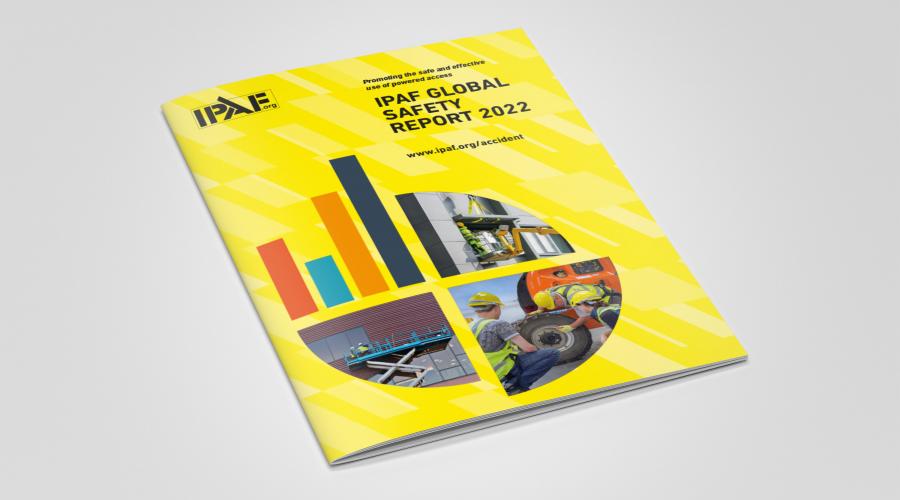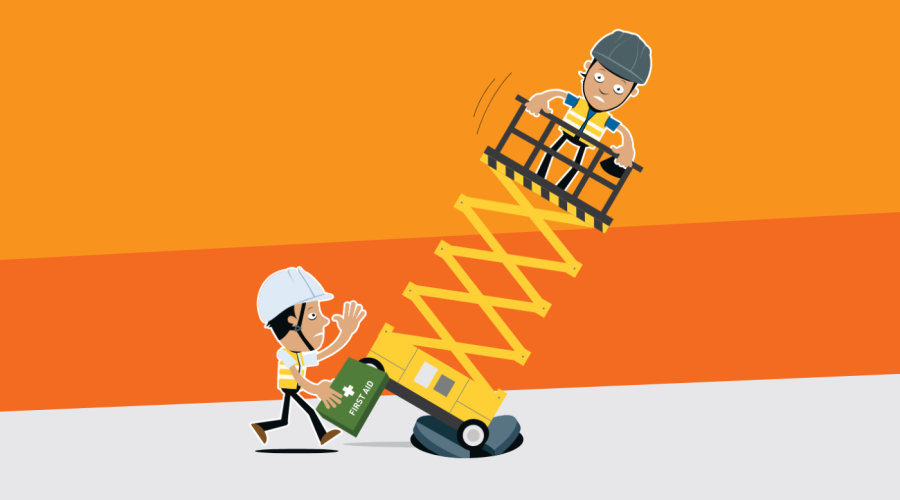IPAF Global Safety Report analyses ten years of incident data

Falls from the platform, electrocution and platform overturns are the most common type of incidents leading to serious injuries and deaths over the past ten years, according to the latest Global Safety Report, compiled by the International Powered Access Federation (IPAF) from analysis of anonymised data collected via IPAF’s Accident Reporting Portal.
Launched via a webinar on 30 June, the IPAF Global Safety Report 2022 analyses the latest data collected via the IPAF portal (www.ipafaccidentreporting.org) covering the period 2012-21, and comparing year-on-year and three-year trends to identify how well the industry is doing in tackling the key causes of accidents involving powered access.
In this year’s report, IPAF is able to look back over a full ten-year’s worth of data, as the federation began gathering incident reports in 2012. Data from the whole 2012-2021 range indicates 4,374 reports, including 4,462 lost-time incidents (LTIs) and 585 fatalities. Reports were gathered from 41 countries across the ten-year period.
In terms of incidents leading to one or more fatalities, across the full ten years of available data there have been three causes as the most common type of incidents: Falls from the platform; electrocutions; and overturns. These are followed by entrapment; with MEWP inoperable mechanical/technical issues having risen to fifth place; hit by vehicle or machine in sixth position and hit by falling object in seventh.
Looking at just 2021, there were 603 reports from 28 countries, with 628 people involved, resulting in 109 fatalities. This is a slight reduction on the number of fatalities during 2020, when there were 126. The country that submitted the most reports in 2021 was the UK, accounting for 60.8% of reports received. The US submitted 18.7% of the reports and the Republic of Korea 4.9% – a significant increase on previous years.
The sector from which most incidents were reported was the powered access rental industry with 43%, followed by construction with 29% of incidents. Facilities management accounted for just under a tenth of all reports (9.8%).
Brian Parker, IPAF Head of Safety & Technical, comments: “It is quite a landmark that IPAF’s accident reporting has been going for ten years; currently we are receiving around 600 reports a year from more than 40 countries worldwide – a leap forward from where we were in the early days.
“This report is the first to have been able to look back and analyse data across the full ten-year period, identifying some significant trends. In addition to a focus on falls from the platform, which was the number one cause of serious injuries and deaths over that period, we have also used the report to highlight some of the specific trends identified when conducting rental activity – delivery, collection, loading and unloading MEWPs, manoeuvres in depots, demonstrations on site, cleaning and maintenance of machines.
“Given what the data is telling us, reducing falls from the platform is the key priority of IPAF’s Don’t Fall For It! global safety campaign this year – and we hope this can make a measurable impact in terms of driving down these incidents in our industry. Also, by highlighting the risks and incidents associated with rental activity, we hope this will assist in making those activities safer, giving something back to our members in the rental industry who have been enthusiastic supporters of IPAF’s accident reporting since day one.”
Looking at 2021 data, reports by machine category show mobile boom-type MEWPs (3b) were the most common type of equipment involved in incidents, accounting for 29% of reports. Then came mobile vertical-type (3a) machines at just under a quarter of reports (23.7%), followed by static boom-type (1b) MEWPs on 21.5%.
Peter Douglas, CEO & Managing Director of IPAF, says: “We use this detailed database to inform all the work we do at IPAF – including updating our globally recognised training and forming the basis of our worldwide safety campaigns, such as the current Don’t Fall For It! initiative aimed at reducing falls from the platform.
“What this report shows is that we need to challenge ourselves as an industry: Is there more we could be doing as to reduce these numbers? We hope that powered access stakeholders around the world read the report, to understand the key trends and benchmark their own safety programmes. By working collaboratively, the industry can continue to develop solutions to the most pressing safety issues identified in the report.
“I’d like to thank all those who helped make this report possible: The IPAF International Safety Committee, our dedicated IPAF team, including our country and regional reps, and of course all those who are reporting into the IPAF portal on a regular basis. I urge everyone to download and view this report, to consider what the trends are showing us and to benchmark safety activities against the recommendations in the report.
“We need to see more reporting from across all sectors of our industry and from as many countries as possible; not least via the ePAL app that provides quick and easy on-the-spot incident reporting. We hope this empowers operators to report all accidents, as well as minor and near-miss incidents, which often go under-reported.”
Mark Keily, QHSE Director at Sunbelt Rentals and Chair of IPAF’s International Safety Committee (ISC), which helps to verify and analysis the anonymised incident reports and to produce the Global Safety Report each year, adds: “While numbers going up can be a result of better reporting, it is still a concern to note that the main causes of serious injury and death when using powered access machines haven’t really changed much in the past ten years. As well as verifying and analysing data, the ISC commits to periodically review IPAF safety and technical guidance to ensure it is up to date and reflects what the latest trends are telling us, beginning with the IPAF H1: Fall protection in MEWPs guidance.
“The IPAF Global Safety Report is never going to have all the answers that our industry requires, but it does clearly set out key areas of concern that should then allow industry stakeholders to review their own working practices to ensure they have adequate control measures in place.”
● To view and download your free copy of the IPAF Global Safety Report 2022, visit www.ipaf.org/accident, and a recording of the launch webinar is now available on IPAF’s YouTube channel for anyone who was unable to join the live broadcast. For upcoming IPAF events and presentations see www.ipaf.org/events; to review past IPAF reports, webinars and supporting materials visit www.ipaf.org/resources
